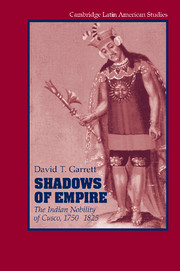Book contents
- Frontmatter
- Contents
- List of Illustrations
- Acknowledgments
- Pueblos Mentioned in Text
- Pueblos on Maps, by Province
- Introduction
- Part I INDIAN ELITES AND THE COLONIAL ORDER
- 1 Spanish Conquest and the Habsburg Reforms
- 2 The Long Seventeenth Century
- Part II THE INDIAN NOBILITY OF BOURBON CUSCO
- Part III CRISIS AND COLLAPSE
- Conclusion
- Appendix
- Glossary
- Bibliography
- Index
2 - The Long Seventeenth Century
Published online by Cambridge University Press: 19 October 2009
- Frontmatter
- Contents
- List of Illustrations
- Acknowledgments
- Pueblos Mentioned in Text
- Pueblos on Maps, by Province
- Introduction
- Part I INDIAN ELITES AND THE COLONIAL ORDER
- 1 Spanish Conquest and the Habsburg Reforms
- 2 The Long Seventeenth Century
- Part II THE INDIAN NOBILITY OF BOURBON CUSCO
- Part III CRISIS AND COLLAPSE
- Conclusion
- Appendix
- Glossary
- Bibliography
- Index
Summary
The social space and privileges conceded to Peru's Indian elites in the later sixteenth century remained intact for almost two centuries. However, indigenous societies underwent enormous changes in the Andes' “long seventeenth century” between the Toledan and Bourbon reforms, or the epidemics of the 1580s and that of 1720. As a result, the Indian elites of Bourbon Cusco were a creation not only of preconquest stratification and attempts by sixteenth-century officials to reform indigenous society, but also of the complex colonial society that emerged in the next century. Driving these changes were the histories of Peru's two ethnic republics: demographic, economic, and cultural collapse and contraction in the Indian, expansion in the Spanish. Catastrophic population decline, coupled with the heavy demands of the crown, provoked widespread migration, the destruction of many communities and the creation of others. Because the Indian elites of the colonial Andes were generally defined locally, and their authority and wealth stemmed from their position within their ayllus and pueblos, the dynamics of community collapse and formation affected them not as a legal estate, but as families and lineages whose privileged position was as precarious as the survival of their communities. In addition, the mass death destroyed the tributary labor on which the high civilization of the Incas had depended, and the religious practices, arts, and organization of the sixteenth-century Andes suffered terribly over the next century, as indigenous societies were now too small to maintain them. Preconquest civilization also suffered from the imposition of many aspects of Spanish civilization – Christianity, monogamy, Spanish literacy, courts of law – both through aggressive, sporadic campaigns and a gradual, and more profound, permeation.
- Type
- Chapter
- Information
- Shadows of EmpireThe Indian Nobility of Cusco, 1750–1825, pp. 45 - 72Publisher: Cambridge University PressPrint publication year: 2005
- 1
- Cited by



